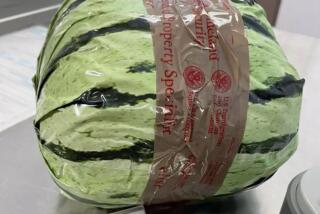US Customs tosses out $100 worth of gourmet ham couple brought back from Spain

Can you bring jamón ibérico into the United States from Spain? One Highland Park couple lost $100 worth of ham after U.S. Customs said no pork products could be brought into the States.
Talk about canned ham.
Elena Campbell Martinez and her husband were returning to Los Angeles from Spain with a pound of vacuum-sealed jamón ibérico.
She was familiar with the luscious ham, which has made legions swoon. And her husband, she said, “fell completely in love with jamón ibérico de bellota.”
Los Angeles Times food editor Amy Scattergood described the jamónes this way: “Jamón ibérico and jamón ibérico de bellota are made from the same black-footed breed of pig, and both are cured by the same methods, using time, salt and some nitrates. But the bellota pigs, finished on acorns, produce hams that are more marbleized. This allows the hams to age longer, yielding a rich, intense, complex flavor.”
Campbell Martinez said her husband planned a dinner party after their return “where we would serve tapas and Spanish wine, showcasing the jamón as the star of the meal.”
It wasn’t to be. They declared the ham on customs forms and were sent to the Department of Agriculture line for review. There, “The agent told us that it is illegal to bring any pork products into the U.S. from any country.
“Our $100 worth of jamón went into the Customs trash at LAX.”
Should it? That’s not easy to figure out.
Here’s what the Customs and Border Protection website says:
“Pork should be commercially canned and labeled in unopened containers. Pork and pork products are not admissible from Mexico, except for cooked pork in small amounts for a meal.”
Obviously, Spain is not Mexico.
But if you dig deeper, you’ll also find this information on the Spanish ham:
“Parma, Iberian or Serrano hams — Call (301) 851-3300 or toll-free at (877) 770-5990. Only certain plants are certified exporters, and the hams must be accompanied by certificates and seals.”
Don’t bother to call that 877 number. It will redirect you to the 301 number, National Import Export Services in Riverdale, Md. Its phones are staffed 5 a.m.-1:30 p.m. Pacific time.
I called at 6:04 a.m. Tuesday and was on hold for the next one hour and nine minutes. When I got a human, she said, “We advise people not to bring in ham from Spain.” It requires, she said, “a health certificate from the Spanish government, and they will not issue it to a person.”
Travel editor Catharine Hamm has an update to this story, here:
Campbell Martinez said she didn’t recall having a certificate.
You can find stuff all over the Internet about smuggling food into this country, but if you’re caught, you can face fines of up to $10,000.
That ham may be savory, but unless it’s worth fines and legal trouble, you’ll be better off buying it here. You’ll pay top dollar, but it won’t be 10 grand a pound.
Follow us on Twitter at @latimestravel
More to Read
Sign up for The Wild
We’ll help you find the best places to hike, bike and run, as well as the perfect silent spots for meditation and yoga.
You may occasionally receive promotional content from the Los Angeles Times.







